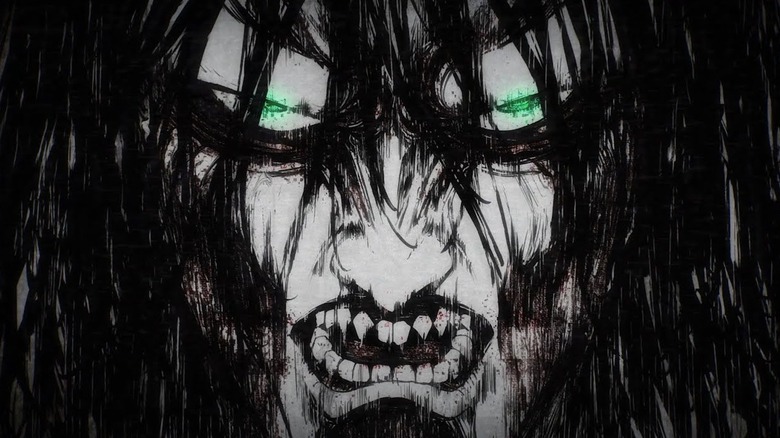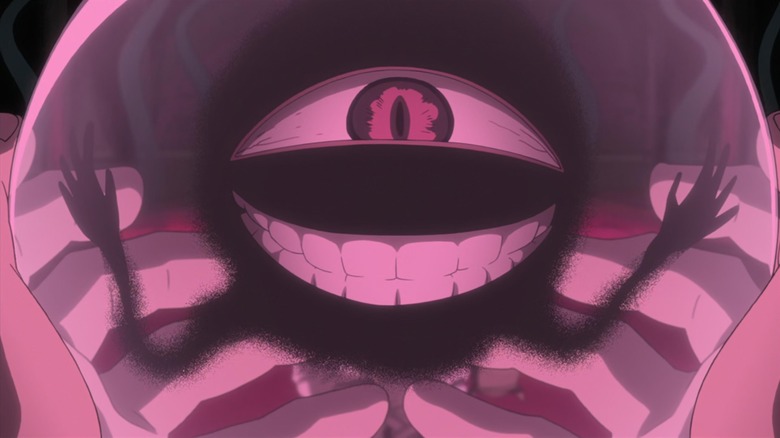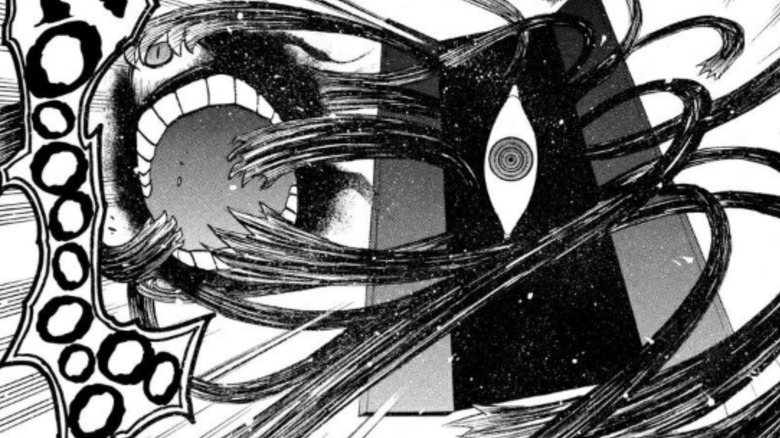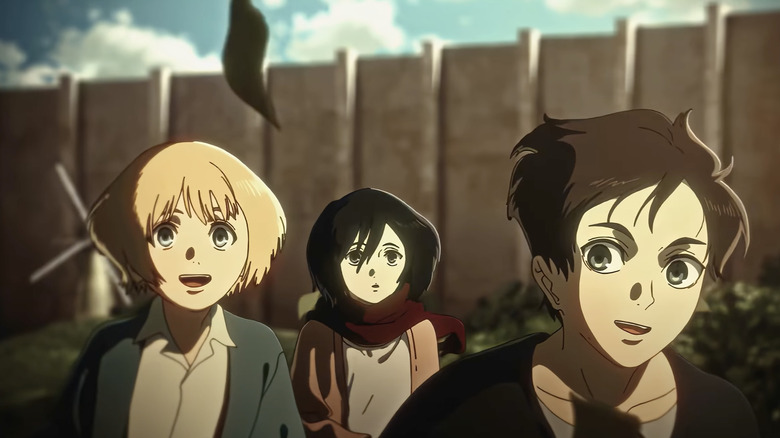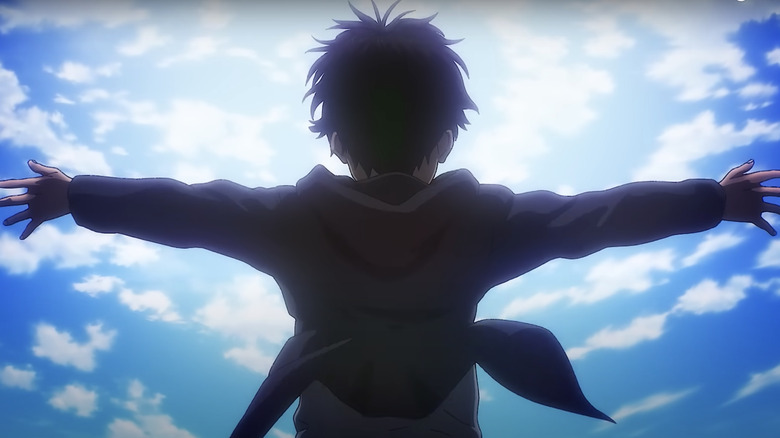The Villains Of Attack On Titan And Fullmetal Alchemist Have The Same Goal
This story contains spoilers for "Attack on Titan" and "Fullmetal Alchemist."
It's easy to compare "Fullmetal Alchemist" and "Attack on Titan," even on the surface. They're both among the most famous shōnen manga, with highly popular anime adaptations to boot. "Attack on Titan" began publication in 2009, as "Fullmetal Alchemist" was wrapping up — concluding in early 2010. In 2021, the series' authors, Hiromu Arakawa ("FMA") and Hajime Isayama ("AOT") sat down together for a dual interview, published in Bessatsu Shōnen Magazine.
Both series have European-styled settings (unusual for Japanese media), explore overlapping themes such as war and its consequences, and are both more violent and relatively more mature than their genre's usual standards. I'd argue one of the most compelling overlaps concerns their respective main villains.
In "Fullmetal Alchemist," the villain is naturally a Homunculus. He's known as "Father" because he created seven other Homunculi, named for the deadly sins of man. For the series' first half, Father is kept in the shadow, and the heroes, Alchemist brothers Edward and Alphonse Elric, deal with his children instead.
On the other hand, "Attack on Titan" introduces its villain upfront — because he first appears to be the hero. Eren Yeager is a young boy who lives in a walled city. He wants to see the outside world but can't because of the man-eating Titans living outside. One day, a Colossal Titan breaks down the Wall and Eren's mother is killed, setting him on the path to revenge.
So, what is it that these characters have in common? They share the same obsessive desire for unobtainable freedom, and that obsession drives both stories to their respective climaxes.
Homunculus, aka the Dwarf in the Flask, aka Father
The Father in "Fullmetal Alchemist" claims he wants knowledge and to achieve perfection. However, those goals are means to an end — what he truly desires above all else is freedom. That wish stems from how he entered the mortal coil.
He began as a piece of the Truth, the metaphysical collection of all knowledge. He was granted individuality when an alchemist in the nation Xerxes pulled a piece of the Truth into reality in exchange for some of his slave's blood. The Homunculus now had an individual mind, but he couldn't leave his flask. So, he befriended that slave, thankful for his "donated" blood and recognizing their shared confinement. The Dwarf gave the slave a name, Van Hohenheim, and taught him how to read and write. With those tools, Hohenheim earned his freedom.
The Homunculus' emancipation would be far more horrifying. The King of Xerxes wanted immortality and asked the Dwarf how to obtain it. The only way would be to turn Xerxes itself into a giant transmutation circle — the sigils that allow Alchemy to take place — and change its population into a Philosopher's Stone to sustain the King. The Homunculus assists in this but manipulates the process so he and his "blood brother" reap the benefits of the genocide instead. In doing so, he finally escapes his flask and gains a new, human body, one identical to the horrified Hohenheim.
Now free and no longer a Dwarf trapped in a flask, the Homunculus achieved his dream — and was left unsatisfied.
I just wanted to be free!
Father kept chasing freedom, but now in abstract ways. He removed the Seven Deadly Sins from his soul because he felt weighed down by humanity. Despite his mastery of alchemy, science still operates under natural laws such as Equivalent Exchange — the only way to create is by sacrificing something else.
Again, Father believes knowledge is the key to escaping these constraints. He realizes that the Earth must have a Gate of Truth just as all life does because the Earth is essentially a living thing. He develops a new plan to recreate the transmutation of Xerxes, this time in the country of Amestris and under the shadow of an eclipse. With the resultant Philosopher's Stone and the celestial harmony, he can open the Gate of the Earth and absorb the knowledge behind it.
Father never grew as an individual. To him, being bound by anything, from his own vices or the laws of the universe, is no different than being trapped in the flask. The only way for him to be free is to become a perfect being — in other words, God. When he reaches up to grab the Truth, he screams with defiant glee, "I will no longer be bound to you or your consequences!"
This plan is Father's undoing. He needs five "human sacrifices" to complete his ritual — this plot point was lost in translation for those who watched the English dub of "Fullmetal Alchemist" — people who've opened their own Gates of Truth and can provide catalytic energy. Three of the sacrifices are Hohenheim and his sons, Ed and Al. When they defeat Father and the Truth absorbs him, he's given the most fitting punishment imaginable. He's reduced to his original Dwarf form and sealed behind the Gate of Truth.
Knowledge may be power, but you can only find freedom from your faults by having the wisdom to accept them.
Eren Yeager
In "Attack on Titan," Eren Yeager's cage was bigger than Father's, but a cage nonetheless. Eren's life behind walls makes him feel like a bird trapped in a cage (or cattle in a pen, depending on the translation). After his friend Armin showed him pictures of what the outside world has to offer, from the tallest mountains to the biggest oceans, his goal is to see those for himself. That's initially why Eren wants to join the Survey Corps, Titan-killing soldiers who explore the outside. After his mother's death, Eren's resolve strengthens.
On his quest for revenge, Eren learns the truth about the world. The Titans are more human than they appear — Eren himself can become one, and the walls meant to safeguard mankind from Titans are made of rows of inert giants. The world outside the walls isn't so empty, either.
In the season 3 finale, "The Other Side of the Wall," the Survey Corps make it to the ocean after clearing the land of Titans. Eren finally gets a taste of his wish, but because of what he knows, he can't enjoy it. Rather than freedom, more struggle awaits Eren and his friends on the other side of the sea. So, all he can do is look forward and ask, "If we did cross the sea and we killed our enemies ... after that, would we finally be free?"
Eren decides he has to answer that question for himself.
Rumbling
Posing as tourists, the Survey Corps infiltrate the nation of Marley, which has been sending the Titans to attack the main characters' native island, Paradis. Finally seeing the reality of the outside world, Eren is "disappointed." So, he decides to destroy the world, using the Colossal Titans within the walls to do so. By breaking down the walls that confined him and flattening the world that hates his people, Eren thinks he'll finally find freedom.
His quest brings him to the first Titan, Ymir, a slave girl who got her powers by chance and became her master's tool of conquest. Even millennia after her death, she's still not free. Her soul is trapped in "the Paths," a nebulous dimension of the desert where Titans are crafted. Eren finally breaks her chains with empathy: "You're no slave. You're no god. You're just a person. You don't need to serve anyone. You can be the one to choose."
Ymir gives Eren the control he desires, and he uses that to start "The Rumbling." As millions of lives are extinguished beneath his feet, Eren imagines himself flying through the air, "This is freedom!" It doesn't last, because Eren's former friends defeat him when the Rumbling is only 80 percent complete. However, the story can't decide if he's the hero or the villain — and Armin thanks him for creating a chance at peace.
Birds are a symbol of freedom in "Attack on Titan." The Survey Corps' ODM gear, grappling hooks which they use to fly through the air and kill Titans, are compared to birds. In the final chapter of "Attack on Titan," Mikasa visits Eren's grave, only for a bird to wrap a scarf around her neck, like Eren once did, and fly off. Eren achieved the freedom he wanted, but he didn't earn it.
